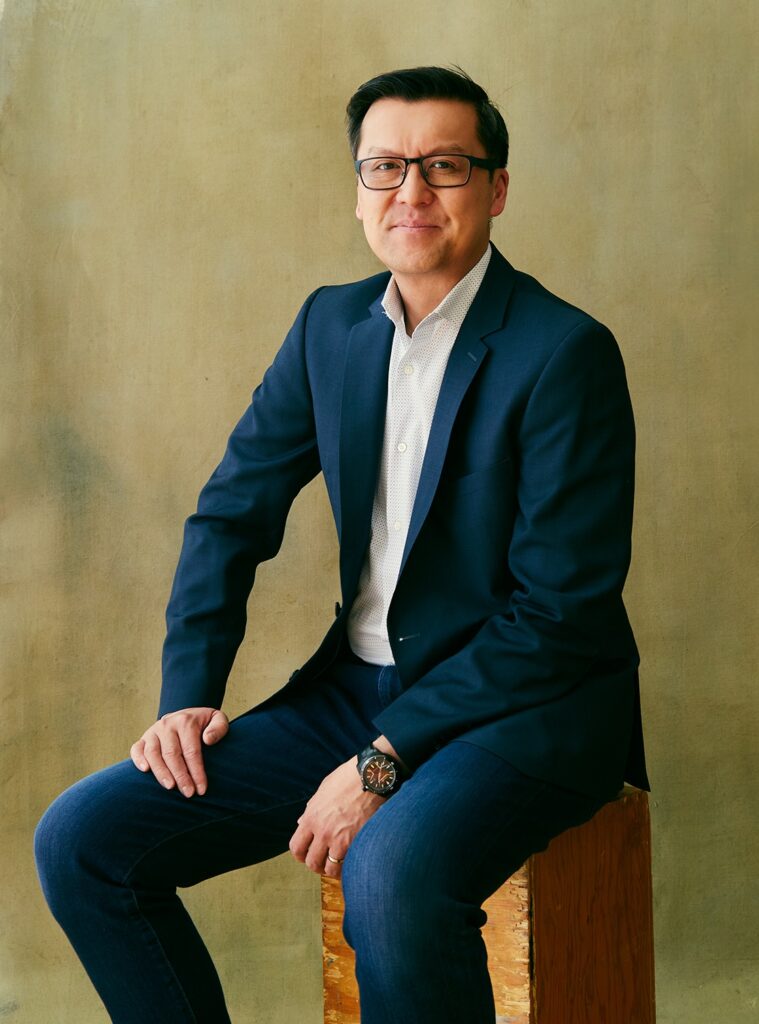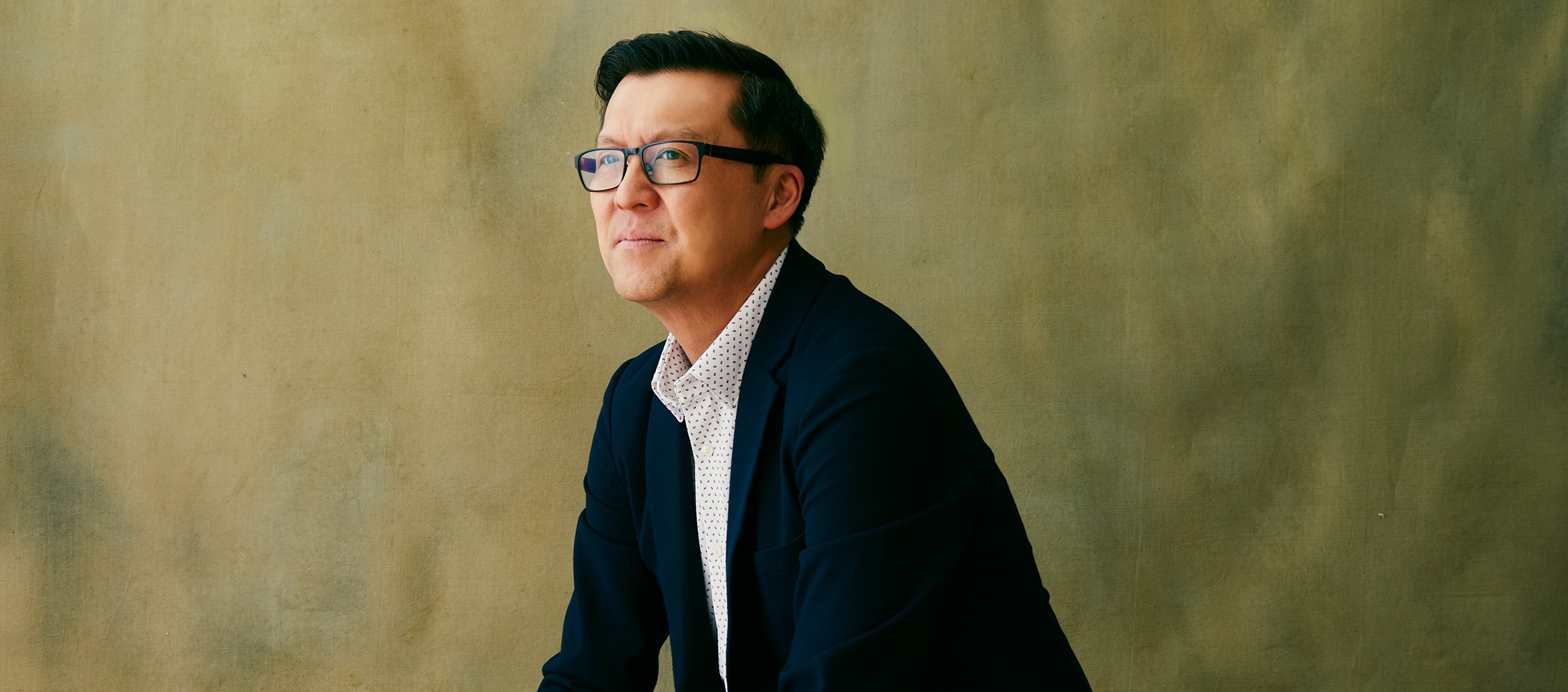Back in the mid-’80s, plenty of kids saw Freddie Mercury and Mick Jagger strut across the stage at Bob Geldof’s Live Aid and thought: I want to be a rock star. A young Douglas Kwan watched the concert and decided to get involved in social-justice work. “I was really inspired by these entertainers recognizing their privilege and raising funds for people who were suffering,” he says. “It told me that collective action can make a difference.”
Flash forward a little more than a decade: Kwan walked into class at Osgoode Hall. At first, he wasn’t especially sold on law school; the focus seemed firmly on Bay Street, and he knew corporate work wasn’t the move for him. But then in 2000, the summer after his second year, Kwan found his people—and his calling—at a student legal clinic. One of his first cases involved supporting a senior lawyer on an appeal at the Immigration and Refugee Board of Canada, after the federal government had denied a mother’s petition to sponsor her daughter from Vietnam. Once the adjudicator ruled in her favour, the woman turned to Kwan, beaming, and threw her arms around him. It might not have been quite the same high as performing before an audience of a billion people, but it was a powerful moment for Kwan.
After law school, he made a very brief foray into the private bar. Then, in 2004, he landed at Mississauga Community Legal Services, a clinic that guides low-income residents through concerns that can range from unscrupulous landlords to wrongful dismissals to troubles with their disability or pension claims. “These are what we describe as poverty-law issues,” Kwan says. “They’re the issues that impact what you need to put food on the table or a roof over your head, not only as protection but to entrench you in the community.”

Douglas Kwan
Director of advocacy and legal services, Advocacy Centre for Tenants Ontario
As a staff lawyer, he was catapulted immediately into the many-tentacled responsibilities of clinic work. He honed his skills as a litigator, representing clients before tribunals and appellate courts. He developed his interest in teaching, offering crash courses in tenant rights at local libraries and community agencies. He met regularly with politicians and government staff, working on law-reform initiatives that would better serve people living in poverty. And he engaged in all manner of community organizing, even getting chased around a building by the property manager as he tacked up flyers to promote a nearby housing-rights seminar. Kwan also seized the opportunity to set precedent. In 2009, in Taft and Rumble v. Whitesands Apartments, he persuaded the Divisional Court that tenants are entitled to mental-distress damages when they face harassment and intimidation from landlords. The decision caught the attention of Seana Moorhead, the executive director of the Grey Bruce Community Legal Clinic and a close colleague of Kwan’s in the legal-clinic world. Moorhead had argued unsuccessfully for those kinds of damages before. “I just thought, Wow, he is one to watch,” she recalls. “This is a case that really pushed the boundaries and that we still use today.”
Over Kwan’s 17 years at Mississauga Community Legal Services, his role grew—to associate executive director, then co-executive director—and so did the size of his team. In 2014, an infusion of long-overdue provincial cash helped the clinic expand existing services, add new services like employment law, and bring on new lawyers, doubling its staff to 22. But in 2019, the Ontario government slashed provincial funding for legal aid by nearly 30 percent, leading to job cuts and a reduction in services. And then, not even a year later, COVID hit. “The pandemic felt like an anvil being dropped after a piano,” Kwan says. “It exposed significant challenges—homelessness, racism, femicide, the poisoned-drug-supply crisis—that continue to have a profound impact.” He began to think about tackling these challenges from a different perch, and, in early 2021, joined the Advocacy Centre for Tenants Ontario, or ACTO, as its director of advocacy and legal services.
It’s hard to overstate the barriers to finding stable rental housing. Vacancy rates in Canada have dropped to roughly 1.5 percent, and, in the past two years, asking rents have risen by 21 percent nationwide; in Toronto, the average asking rent of a two-bedroom apartment sits at about $3,300 a month. At the same time, landlords—both individual investors and large corporations—have been incentivized to turn rental housing into their own financial assets and prioritize profits over the well-being of tenants. That inevitably leads to precarity and conflict, but good luck seeking recourse from the Landlord and Tenant Board: the wait time for a tenant to schedule a hearing sits at 24 months. (That’s three times as long as the wait time for landlord-filed applications.) “It’s unconscionable,” Kwan says. “There are about 10,000 cases in the backlog right now, and the number keeps rising. So it’s an access-to-justice issue.”
The burden placed on tenants has been further fuelled by the board’s pandemic-era switch to online and telephone hearings in almost all cases. Before, hearings were typically held in the community where tenants lived, in locations like their church, library or community centre. “But now they’re being told to access their hearing through a bunch of random numbers and letters,” Kwan says. It’s a considerable disadvantage for renters, who often don’t have the broadband, digital fluency, language skills, expertise or time to meaningfully participate in remote proceedings.
This crisis only makes Kwan’s work at ACTO more urgent. Late last year, his 10-lawyer team secured a major victory when the Court of Appeal held that the Landlord and Tenant Board has to do more to protect tenants from bad-faith evictions. Their advocacy has also helped lead to Hamilton introducing a first-of-its-kind renoviction bylaw this January: when landlords want to evict a tenant in order to renovate a unit, they now have to apply to the city for a permit; the bylaw-enforcement team will review the application and decide if the tenant truly has to move. The goal is to make sure tenants can’t be turfed by landlords looking to rent the unit to new people at higher rates. ACTO also runs the Tenant Duty Counsel Program, which provides legal advice and services for renters appearing before the Landlord and Tenant Board and gives education seminars at organizations like the Ontario Council of Agencies Serving Immigrants.
On the policy side, the team provides written submissions on bills and budgets introduced by all levels of government. “If you think of general service clinics as your walk-in clinics,” Kwan says, “then we’re the surgeons in the hospital.” Whether he’s advocating for stronger rent control, or mandatory affordable units in new high-density developments, or more equitable hearings at the Landlord and Tenant Board, Kwan is quick to emphasize our fundamental right to housing. “Decision-makers can talk about housing like it’s a car, when it’s in fact like water or air,” he says.
And while social-justice work can be overwhelming, he hasn’t lost his early enthusiasm. “I worked at the legal clinic in Mississauga when Doug came on, and from the get-go, he was so passionate about the work we do for low-income people,” says Shalini Konanur, now the executive director of the South Asian Legal Clinic of Ontario. “Every time I speak to him, he still has that same passion. His optimism, empathy and kindness have not changed whatsoever in the 20-plus years I’ve known him. They’ve only gotten stronger.”
Douglas Kwan’s career timeline
1998: Kwan enrolls at Osgoode Hall, after getting a B.A. from York University in economics and business.
2000: After his second year of law school, he spends the summer at Osgoode’s student legal clinic, the Community & Legal Aid Services Program.
2002: Kwan completes his articling term at the mid-sized immigration firm Green & Spiegel.
2003: He works for a brief time on real-estate and immigration files at the small firm Kang & Company.
2004: He joins Mississauga Community Legal Services, which provides free legal services to low-income residents, as a staff lawyer.
2014: A decade into his tenure at Mississauga Community Legal Services, Kwan becomes the associate executive director. “The clinic system is very lean, and unlike law firms and large corporations, we don’t have an HR department,” he says. Successful management, he learns, looks a lot like successful parenting: “You have to know what your values are, set your expectations at the outset, be consistent and communicate well.”
2017: Kwan is promoted to co-executive director at the Mississauga-based clinic.
2021: Kwan is ready for a new challenge. “There comes a point when you’re with an organization for so long that it’s time to move on and learn from somewhere new,” he says. In February, he becomes the director of advocacy and legal services at the Advocacy Centre for Tenants Ontario. Between the housing crisis and a dysfunctional Landlord and Tenant Board, he has plenty to navigate. “The word unprecedented is thrown around too much, but honestly, this moment is unprecedented,” he says. “We need the response from decision-makers to match the urgency.”
Photography by Nick Wong.


